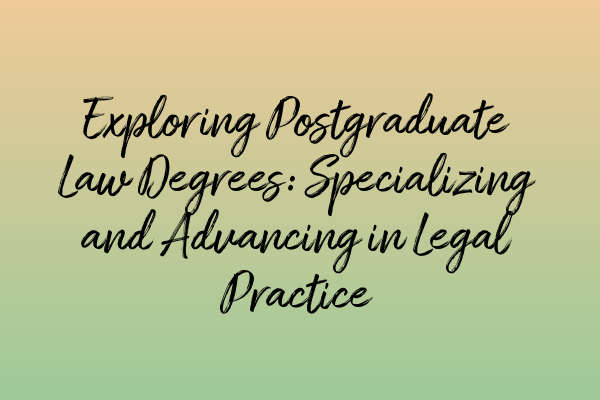Hello and welcome to Become Solicitor SRA! In today’s blog post, we will be exploring the topic of postgraduate law degrees and how they can help you specialize and advance in your legal practice. Whether you are a recent law graduate or a practicing solicitor looking to take the next step in your career, pursuing a postgraduate law degree can offer you a wealth of opportunities and open doors to new areas of expertise.
Before we dive into the specifics of postgraduate law degrees, let’s address a common question: why should you consider furthering your legal education? The legal profession is constantly evolving, and staying at the top of your game requires ongoing learning and development. By pursuing a postgraduate law degree, you can enhance your knowledge, skills, and credibility as a legal professional.
Now, let’s take a closer look at some of the different types of postgraduate law degrees and the specialized areas of legal practice they can help you explore:
1. Master of Laws (LLM)
The Master of Laws (LLM) is one of the most popular postgraduate law degrees. It allows you to delve deeper into a specific area of law or gain a broader understanding of various legal disciplines. An LLM can provide you with advanced legal knowledge and analytical skills, making you an expert in your chosen field.
If you’re interested in criminal law, our related article, SQE Prep: Tips and Tricks to Excel in Criminal Law, offers valuable insights and strategies for excelling in this specialized area.
2. Postgraduate Diploma in Legal Practice
The Postgraduate Diploma in Legal Practice is a professional qualification that prepares you for the Solicitors Regulation Authority (SRA) assessments and the Solicitors Qualifying Examination (SQE). This qualification focuses on developing your practical skills and knowledge required to practice law. The SQE is the new centralised exam for qualification as a solicitor in England and Wales, so being well-prepared is essential.
If you’re interested in preparing for the SQE, our article on SQE Prep Made Easy: Strategies and Resources can provide you with helpful tips and resources to assist you in your preparations.
3. Doctor of Philosophy (PhD) in Law
A PhD in Law is the highest level of academic achievement in the field of law. It involves conducting original and extensive research on a specific legal topic. A PhD can be a pathway to a career in academia or research, allowing you to contribute to the advancement of legal knowledge.
If you’re interested in exploring a specific legal topic in-depth, undertaking a PhD may be the right choice for you. You can find more information on cross-examination techniques in our related article, Cross-Examination Techniques: Mastering the Art of Questioning.
4. Specialized Professional Certifications
In addition to postgraduate degrees, there are various specialized professional certifications available that can help you specialize in specific areas of law. These certifications are often focused on niche practice areas and can provide you with a competitive edge in the job market.
For example, individuals interested in non-governmental prosecutions in criminal cases can benefit from our article on Private Prosecutions: Exploring Non-Governmental Prosecutions in Criminal Cases.
Now that we’ve explored the different types of postgraduate law degrees and specialized certifications, let’s consider some of the advantages of pursuing further education in law:
1. Enhanced Knowledge and Skills
Pursuing a postgraduate law degree allows you to deepen your understanding of specific legal concepts and developments. You’ll gain valuable insights and knowledge that can help you excel in your chosen area of specialization.
2. Increased Career Opportunities
Having a postgraduate law degree can significantly expand your career opportunities, both within law firms and other organizations. It demonstrates your commitment to continuous learning and can set you apart from other candidates.
3. Networking Opportunities
During your postgraduate studies, you will have the opportunity to connect with fellow students, professors, and professionals in your field. Building a strong professional network can provide you with valuable connections and potential future collaborations.
4. Personal and Professional Growth
Pursuing a postgraduate law degree is a challenging endeavor that requires dedication and hard work. Throughout the process, you will develop valuable skills such as critical thinking, research, and time management. These skills can benefit you not only in your legal career but in various other aspects of life as well.
In conclusion, postgraduate law degrees offer numerous opportunities for specialization and career advancement. Whether you choose to pursue an LLM, a postgraduate diploma, a PhD, or a specialized certification, furthering your legal education can enhance your knowledge, skills, and professional opportunities.
Interested in learning more about criminal law? Our article on Terrorism and Criminal Law: Balancing National Security with Justice provides insights into the delicate balance between national security and justice in this field.
If you have any questions or would like further guidance on postgraduate law degrees, please feel free to reach out to us. We are here to support you on your journey towards becoming a successful solicitor.


Leave a Reply